Opinion
Cattle slaughter ban and common sense
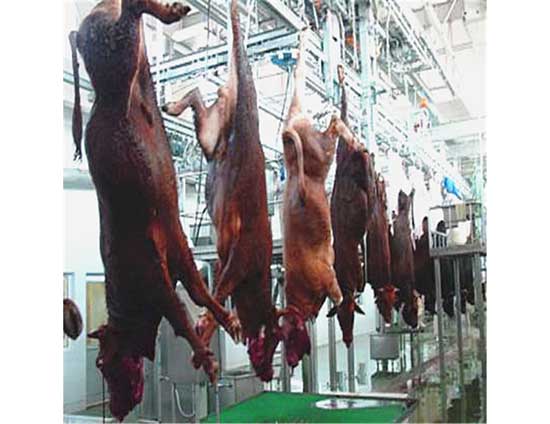
By Rohana R. Wasala
It was reported in the media (September 8, 2020) that Prime Minister Mahinda Rajapaksa’s proposal for a ban on cattle slaughter received cabinet approval, as well as the approval of the government parliamentary group. Some Buddhist monks, and allied groups who have long been agitating for such legislation to be enacted, raised euphoric cries and invoked blessings on the Prime Minister and the President. I don’t know how the two privately reacted to the acclamation they received on the basis of a controversial measure, tentatively proposed, but not finally agreed upon: Did they accept the still unearned accolades with a feeling of exultant self-vindication or with a sense of gnawing doubt that the whole thing might misfire? They are more likely to experience the latter state of mind, because this ban cannot be imposed without harmful repercussions, given the unalterable ground realities that must be recognized and accommodated before enacting and implementing the proposed ban. This is so particularly in relation to the prevailing economic and political crises in today’s globalized world, of which Sri Lanka is a small member, hardly noticed, except for her strategic location and her beleaguered state due to the same circumstance, trapped between three superpowers – two global and one regional. The domestic fallout could be even more critical. This is the worst imaginable time for such a radical measure to be implemented, however popular it could be among a section of the people.
But let’s not be too alarmed. Media Minister and Cabinet spokesman Keheliya Rambukwella (a good choice for the latter job, in my view) managed to assuage the fears of sceptics, like me, who are not convinced about the actual benefits, but are really concerned about the possible unsavoury economic, socio-cultural, and political consequences, of a ban being imposed on cattle slaughter, when Rambukwelle told the local media that Prime Minister Rajapaksa ‘hopes to ban cattle slaughter’ and that ‘he would decide when to submit the proposal to the government’. The government announced that a final decision will be delayed by a month (as reported in the online Istanbul/Turkey based TRT News Magazine). Rajapaksa’s cautious non-commitment hints at the possibility of a reassessment of the pros and cons of the move and points towards the likelihood of sanity finally prevailing. But this will need a lot of reverse convincing to do among the convinced (I mean, among those who are for the ban).
From my point of view (for what it is worth), it is vitally important to be mindful of how the ban would be viewed abroad, as well as among domestic non-Buddhist religious minorities, though it might go down well with a majority of Buddhists and Hindus. There is no question about trying to assert our rights as an independent sovereign nation and to pursue political and economic policies that we believe serve the best interest of our people. However, divisive party politics of the recent years have landed Sri Lanka in such a vulnerable situation, globally, that any government that even occasionally dares to defy undue superpower pressures in order to accommodate the legitimate demands of its own people, gets labelled as undemocratic, autocratic, oppressive, and therefore ripe for replacement. For a Sri Lankan government to be on its best behaviour is no guarantor of its survival in a context where India, China, and America are each looking after their own national interest in a competitive relationship with one another at the expense of Sri Lanka’s very survival. But what can we do about it? I think that the present government, under the joint leadership of the President and the Prime Minister, is doing what it can in these internationally beleaguered and internally treacherous times. Insisting on passing potentially divisive legislation is no way to help them.
Today, with Gotabaya Rajapaksa as President, we have the first executive head of government since independence who has found a way to consult with the Maha Sangha as a monolithic entity through non-political, non-sectarian interaction. He appointed a board of monks called the Bauddha Upadeshaka Sabhawa (the Buddhist Advisory Council) to advise him, and had its first meeting on April 24, 2020. It consists of the Mahanayake Theras of the Three Nikayas and a group of prominent scholar monks, who are specialists in various fields, connected with the Buddha Sasana, in which they have time-honoured claims and commitments. The monks meet with the President on the third Friday of every month. In their last meeting, on September 18, they commended the President for taking steps, in accordance with their proposals, for, among other things, the protection of historical sites of archaeological importance, development of Pirivena education, designing of a national educational policy, control of the drug menace, etc. But, as far as the Derana TV news coverage was concerned, there was no mention of the cow slaughter ban proposal. Can’t this be an indication that it is not being perceived as such a pressing issue?
There is no gainsaying the fact that Buddhist monks worked tirelessly for the victory of the nationalist camp, and they did not do so for any personal benefit. There are a number of activist monk groups each articulating different issues of broad national interest such as environment protection in addition to the central issue of the threat to the Buddha Sasana, the predominantly Buddhist nation (the people) and the unitary state that comes from the handful of foreign-sponsored separatist racists and religious extremists among the peaceful mainstream Tamil and Muslim minorities, respectively. These traitorous elements dominated the previous regime. The President appointed the Buddhist Advisory Council, partly in recognition of the service they did in helping to save the country from misgovernance, but primarily in fulfilment of the constitutional requirement of giving foremost place to Buddhism. We can expect nothing but good from this interaction between the prominent Nayake and scholarly monks and the President. Is it likely that they will fail to understand the problematic nature of the proposed ban on cattle slaughter?
Be that as it may, we can’t overlook the fact that some well known leading activists, heads of some animal rights and public health maintenance-related organizations, welcomed the proposal with great enthusiasm, despite the principal proponent’s non-committal stance. These included such prominent personalities as the Justice for Animals and Nature Organization Chairman Ven. Dr Omalpe Sobhita Thera, founder of Sarvodaya Dr A.T. Ariyaratne, and GMOA head, medical specialist Dr Anuruddha Padeniya. They published a public announcement-cum-invitation to ‘all professional and civil organizations’ asking them to attend a meeting at the ‘Sangha Headquarters,’ on Alvitigala Mawatha, on September 20. They are urging the enforcement of the ban proposal. An announcement-cum-invitation was issued on September 17, the day that marked the 156th birth anniversary of Anagarika Dharmapala, who had pioneered the agitation for putting an end to cattle slaughter. In his time, probably, it was more meaningful and less controversial to do so than today. This announcement appeared in the online Lankaweb Forum page the same day, where I read it. It must have been published elsewhere, too. The author and principal signatory to the document, Ven. Sobhita, wrote (in translation): ‘It need hardly be stressed that the principled, determined and fearless enactment of the praiseworthy decision taken by the government MPs, headed by the Prime Minister, requires the approval and support of the general public. We believe that we are going to get your fullest cooperation in this regard. We intend to call a meeting of delegates from such organizations and take decisions in connection with organizing the relevant future activities to achieve this aim.’
Personally, I have the highest respect for these three eminent persons (who have already done much commendable service to Mother Lanka in their different capacities), and the others mentioned in the document, and also empathize fully with their commitment to the cause they believe in, but I do not share their conviction about the feasibility, the functionality, or the actual benefits, of the proposition that they are wholeheartedly supporting. I would support a movement with the same devotion to stop animal slaughter in general, not just cattle slaughter, if there was such a movement, but I know that it is an unlikely initiative, an impossibility even. I don’t see any rationality in such a project. The kind of free rational thinking that the Buddha advised the young Kalamas to adopt without blindly following him – the way to Enlightenment, budh,rational intelligence, that Narendra Modi identified some months ago, invoking the common intellectual heritage of India which we, too, share through Buddhism, as opposed to yudh, war/conflict, as the best way to resolve problems – seems to be at a premium, i.e., there is paradoxically little available of it – in the sacred Treasury of Theravada Buddhism that Sri Lanka is often claimed to be. Occasional submergence of practical rational thinking as in this case – our rational faculty sometimes becomes manifest in its humblest form of common sense – could prove costly in more than one sense for the whole country.
Rational minds can conceive of alternative ways of dealing with a problem, when sometimes the most direct solution is likely to create worse problems than the original problem itself like the cattle slaughter ban, if implemented, will certainly do. It is not likely to contribute towards enhancing intercommunal goodwill as already implied above. Many Muslims are employed in the meat industry, and there are secondary industries, like tanning (making leather out of animal hides), shoe making, and the manufacture of leather products, such handbags, waist belts, saddles, some percussion instruments, etc. Import of beef from abroad will lead to increase in prices, in addition to the loss of jobs, and the drain on scarce foreign exchange that it will entail. We may easily imagine the problematic implications for the important dairy milk industry, the development of which is essential for stopping the import of toxic milk powder.
- News Advertiesment
See Kapruka’s top selling online shopping categories such as Toys, Grocery, Flowers, Birthday Cakes, Fruits, Chocolates, Clothing and Electronics. Also see Kapruka’s unique online services such as Money Remittence,News, Courier/Delivery, Food Delivery and over 700 top brands. Also get products from Amazon & Ebay via Kapruka Gloabal Shop into Sri Lanka.
Opinion
Take Human Rights seriously, not so much the council or office
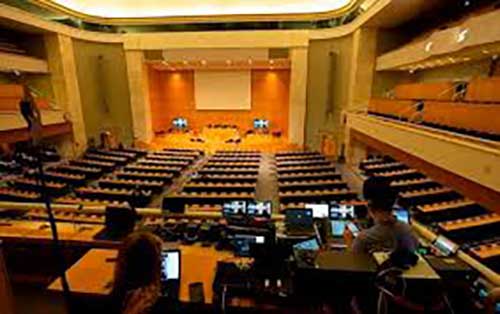
By Dr Laksiri Fernando
The 46th Session of the UN Human Rights Council started on 22 February morning with obvious hiccups. The Office, to mean the Office of the UN High Commissioner for Human Rights, finally decided to hold all sessions virtually online, only the President of the Council and the assistants in the high table sitting at the UN Assembly Hall in Geneva. The President, Ms. Nazhat Shammen Khan, Ambassador from Fiji in Geneva, wearing a saree, was graceful in the chair with empty seats surrounding.
In the opening session, the UN General Assembly President, UN General Secretary, UN High Commissioner for Human Rights, and Head of Foreign Affairs, Switzerland (as the host country), addressed remotely the session. In fact, there was no need for Switzerland to have a special place, as the UN is independent from any host country. Switzerland is fairly ok, however, if this tradition is followed, the UN General Assembly may have to give a special place to the US in New York.
Initial Addresses
UN General Secretary, Antonio Guterres’ address could have been quite exemplary if he gave a proper balance to the developed and developing countries. He talked about racism and fight against racism but did not mention where racism is overwhelmingly rampant (US and Europe) and what to do about it. Outlining the human rights implications of Covid-19 pandemic, he made quite a good analysis. It was nice for him to say, ‘human rights are our blood line (equality), our lifeline (for peace) and our frontline (to fight against violations).’ However, in the fight against violations, he apparently forgot about the ‘blood line’ or the ‘lifeline’ quite necessary not to aggravate situations through partiality and bias. He never talked about the importance of human rights education or promoting human rights awareness in all countries.
His final assault was on Myanmar. Although he did not call ‘genocide,’ he denounced the treatment of Rohingyas as ethnic cleansing without mentioning any terrorist group/s within. His call for the release of Aung San Suu Kyi and other civilian leaders undoubtedly should be a common call of all. However, he did not leave any opening for a dialogue with the military leaders or bring back a dialogue between Aung San and Min Aung, the military leader. With a proper mediation, it is not impossible. Calling for a complete overhaul as the young demonstrators idealistically claim might not be realistic.
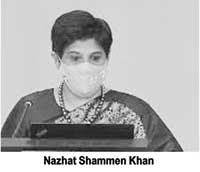 High Commissioner Michelle Bachelet’s address was brief and uncontroversial this time without mentioning any country or region. It is clear by now perhaps she is not the real author of the Report against Sri Lanka, but someone probably hired by the so-called core-group led by Britain. Her major points were related to the coronavirus pandemic trying to highlight some of the socio-economic disparities and imbalances of policy making that have emerged as a result. The neglect of women, minorities, and the marginalized sections of society were emphasized. But the poor was not mentioned. As a former medical doctor, she also opted to highlight some of the medical issues underpinning the crisis.
High Commissioner Michelle Bachelet’s address was brief and uncontroversial this time without mentioning any country or region. It is clear by now perhaps she is not the real author of the Report against Sri Lanka, but someone probably hired by the so-called core-group led by Britain. Her major points were related to the coronavirus pandemic trying to highlight some of the socio-economic disparities and imbalances of policy making that have emerged as a result. The neglect of women, minorities, and the marginalized sections of society were emphasized. But the poor was not mentioned. As a former medical doctor, she also opted to highlight some of the medical issues underpinning the crisis.
Then came the statements from different countries in the first meeting in the following order: Uzbekistan, Colombia, Lithuania, Afghanistan, Poland, Venezuela, Finland, Fiji, Moldova, Georgia, Kazakhstan, Equatorial Guinea, Vietnam, Belgium, and Morocco. The obvious purposes of these statements were different. Some countries were apparently canvassing for getting into the Human Rights Council at the next turn perhaps for the purpose of prestige. Some others were playing regional politics against their perceived enemies. This was very clear when Lithuania and Poland started attacking Russia.
But there were very sincere human rights presentations as well. One was the statement by the President of Afghanistan, Mohammad Ashraf Ghani. He outlined the devastating effects that Afghanistan had to undergo during the last 40 years, because of foreign interferences. The initial support to Taliban by big powers was hinted. His kind appeal was to the UN was to go ‘beyond discourse to practice’ giving equal chance to the poor and the developing countries to involve without discrimination.
Controversial Presentations
China’s Foreign Affairs Minister, Wang Yi, made his presentation almost at the end of the first day. This is apparently the first time that China had directly addressed the Human Rights Council. Beginning with outlining the devastating repercussions of the coronavirus pandemic he stressed that the world should face the challenges through ‘solidarity and cooperation.’ He broadened the concept to human rights solidarity and cooperation. His expressed views were quite different to the others, particularly to the Western ones.
He frankly said that what he expresses are the views of China on human rights without claiming those are absolute truths or forcing others to believe or implement them. There were four main concepts that he put forward before the member countries. First, he said, “We should embrace a human rights philosophy that centres on the people. The people’s interests are where the human rights cause starts and ends.” Second, he said, “we should uphold both universality and particularity of human rights. Peace, development, equity, justice, democracy, and freedom are common values shared by all humanity and recognized by all countries.” “On the other hand,” he said, “countries must promote and protect human rights in light of their national realities and the needs of their people.”
“Third,” he said, “we should systemically advance all aspects of human rights. Human rights are an all-encompassing concept. They include civil and political rights as well as economic, social, and cultural rights.” He then emphasized, “Among them, the rights to subsistence and development are the basic human rights of paramount importance.” Fourth, “we should continue to promote international dialogue and cooperation on human rights. Global human rights governance should be advanced through consultation among all countries.”
It was on the same first day before China, that the United Kingdom launched its barrage against several countries not sparing Sri Lanka. The Foreign Secretary, Dominic Raab, delivered the statement from top to bottom attacking alleged violating countries on human rights. But there was no mentioning of Israel for the repression of Palestinians or the systemic racism rampaging in the United States, including the 6 January attacks on the Capitol by extremist/terrorist groups.
His first sermon was on Myanmar without acknowledging the British atrocities or mismanagement of this poor and diverse country during the colonial period. He was quite jubilant over implementing sanctions and other restrictions over the country. Many sanctions, in my opinion, are extortions. Undoubtedly, Aung San Suu Kyi and other leaders should be released, and democracy restored. This is a task of the whole council and when one or two countries try to grab the credit, there can be obvious reservations of others.
His further scathing attacks were against Belarus, Russia, and China. Some appeared factually correct but not necessarily the approach or the motives genuine. The following is the way he came around Sri Lanka. He said,
“Finally, we will continue to lead action in this Council: on Syria, as we do at each session; on South Sudan; and on Sri Lanka, where we will present a new resolution to maintain the focus on reconciliation and on accountability.”
‘Action’ to him basically means repeatedly passing resolutions, of course imposing economic and other sanctions. He said, “as we do at each session”; like bullying poor or weak countries at each session. Can there be a resolution against Russia or China? I doubt it.
What would be the purpose of presenting a resolution against Sri Lanka? As he said, “to maintain the focus on reconciliation and on accountability.” This will satisfy neither the Tamil militants nor the Sinhalese masses. But it might satisfy the crafty Opposition (proxy of the defeated last government). This is not going to be based on any of the actual measures that Sri Lanka has taken or not taken on reconciliation or accountability. But based on the ‘Authoritarian and Hypocritical Report’ that some anti-Sri Lankans have drafted within the Office of the High Commissioner for Human Rights. This what I have discussed in my last article.
In this context, successful or not, the statement made by the Sri Lanka’s Minister of External Affairs, Dinesh Gunawardena, in rejecting any resolution based on the foxy Report of the Office of the UN High Commissioner for Human Rights, in my concerned opinion, is absolutely correct.
Opinion
President’s energy directives ignored by the Power Ministry: Another Point of View

Dr Tilak Siyambalapitiya
Dr Janaka Rathnasiri laments (The Island 19 Feb 2021) that the Power Ministry has ignored the President’s directive to draw 70% of energy from renewable sources by 2030. I saw the approved costs of electricity production for 2019, published by the Public Utilities Commission (PUCSL).
PUCSL has also approved the prices to sell electricity to customers. Although various customers pay at various “approved” prices, the average income from such “approved” prices in 2019 was Rs 17.02 per unit. It is not only the Ministry, according to Dr Rathnasiri, ignoring the President; PUCSL is also breaking the law, which says prices and approved costs should be equal.
 So there is already an illegal gap of Rs 21.59 minus 17.02 = Rs 4.57 per unit of electricity sold. If electricity prices are not to be increased, as stated by many in the government and PUCSL, let us say the following: Distribution costs should decrease by 0.57 Rs per unit. Generation costs should decrease by Rs 4.00 per unit.
So there is already an illegal gap of Rs 21.59 minus 17.02 = Rs 4.57 per unit of electricity sold. If electricity prices are not to be increased, as stated by many in the government and PUCSL, let us say the following: Distribution costs should decrease by 0.57 Rs per unit. Generation costs should decrease by Rs 4.00 per unit.
PUCSL also published the approved cost of purchasing or producing electricity from various sources for 2019. The actual energy values were different to what was approved, but let us stick to PUCSL approved figures:
I suggest Dr Rathnasiri fills-up the following table, to show how much electricity will cost in 2030 to produce and deliver, if the President’s 70% target is to be achieved and for PUCSL to abide by the law. Let us assume that electricity requirement in 2030 will be double that of 2019.
 Since PUCSL has to save Rs 4 from 13.92, the average selling price for energy should be Rs 13.92 minus 4.00 = Rs 9.92. With a target network loss of 7% (in 2019 it was 8.4%), the average cost of production has to be Rs 9.27 per unit. Eight cages have to be filled-up by Dr Rathnasiri.
Since PUCSL has to save Rs 4 from 13.92, the average selling price for energy should be Rs 13.92 minus 4.00 = Rs 9.92. With a target network loss of 7% (in 2019 it was 8.4%), the average cost of production has to be Rs 9.27 per unit. Eight cages have to be filled-up by Dr Rathnasiri.
In 2012, PUCSL approved the energy cost of electricity produced from coal power to be 6.33 Rs per kWh. In 2019, PUCSL approved 9.89 (56% increase). For renewable energy, it was 13.69 in 2012, and 19.24 in 2019 (a 40% increase, but double the price of electricity from coal fired generation). In 2012, rooftop solar was not paid for: only give and take, but now paid Rs 22, against Rs 9.89 from coal. There seems to be something wrong. The price reductions of renewable energy being promised, being insulated from rupee depreciation, are not happening? Either Sri Lanka must be paying too little for coal, or it may be renewable energy is severely over-priced?
On coal we hear only of some corruption every now and then; so Sri Lanka cannot be paying less than it costs, for coal.
Enough money even to donate
vaccines
 Another reason for the Ministry of Power to ignore the President’s directive may be the Ministry’s previous experience with similar Presidential directives. In 2015, the President at that time cancelled the Sampur coal-fired power plant, and the Ministry faithfully obliged. That President and that Prime Minister then played ball games with more power plants until they were thrown out of power, leaving a two-billion-dollar deficit (still increasing) in the power sector. Not a single power plant of any description was built.
Another reason for the Ministry of Power to ignore the President’s directive may be the Ministry’s previous experience with similar Presidential directives. In 2015, the President at that time cancelled the Sampur coal-fired power plant, and the Ministry faithfully obliged. That President and that Prime Minister then played ball games with more power plants until they were thrown out of power, leaving a two-billion-dollar deficit (still increasing) in the power sector. Not a single power plant of any description was built.
Where is this deficit? You do not have to look far. In the second table, replace 24.43 with 9.89, to reflect what would have happened if Sampur was allowed to be built. The value 12.79 will go down to 8.55, well below the target of Rs 9.27 per unit to produce. Not only would CEB and LECO report profits, but the government too could have asked for an overdraft from CEB to tide over any cash shortfalls in the treasury. All this with no increase in customer prices. Producers of electricity from renewable energy could enjoy the price of 19.24 Rs per unit. And that blooming thing on your rooftop can continue to enjoy Rs 22 per unit. The Minister of Power, whom Dr Rathnasiri wants to replace with an army officer, would have been the happiest.
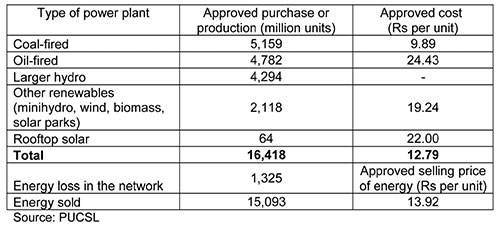 In the absence of Sampur (PUCSL’s letter signed by Chairman Saliya Mathew confirmed cancellation and asked CEB not to build it), PUCSL approved electricity to be produced at Rs 21.59 and sold at Rs 17.02 per unit. The annual loss would be Rs (21.59 – 17.02) x 15,093 = Rs 69 billion per year of approved financial loss. Sri Lanka has a Telecom regulator, an Insurance regulator, a Banking regulator, who never approve prices below costs. Sometime ago the telecom regulator asked the operators to raise the prices, when operators were proposing to reduce prices amidst a price war. But the electricity industry regulator is different: he approves costs amounting to 27% more than the price, not just once but, but continuously for ten long years !
In the absence of Sampur (PUCSL’s letter signed by Chairman Saliya Mathew confirmed cancellation and asked CEB not to build it), PUCSL approved electricity to be produced at Rs 21.59 and sold at Rs 17.02 per unit. The annual loss would be Rs (21.59 – 17.02) x 15,093 = Rs 69 billion per year of approved financial loss. Sri Lanka has a Telecom regulator, an Insurance regulator, a Banking regulator, who never approve prices below costs. Sometime ago the telecom regulator asked the operators to raise the prices, when operators were proposing to reduce prices amidst a price war. But the electricity industry regulator is different: he approves costs amounting to 27% more than the price, not just once but, but continuously for ten long years !
That is 370 million dollars per year as of 2019, the economy is spending, and for years to come, to burn oil (and say we have saved the environment). Did the Minister of Health say we are short of 160 million dollars to buy 40 million doses of the vaccine? Well, being a former Minister of Power, she now knows which Presidential “order” of 2015 is bleeding the economy of 370 million dollars per year, adequate to buy all vaccines and donate an equal amount to a needy country.
Prices are the production costs approved by PUCSL for 2019. The selling price approved by the same PUCSL was Rs 9.27 per unit.
Opinion
Confusion on NGOs and NSOs in Sri Lanka
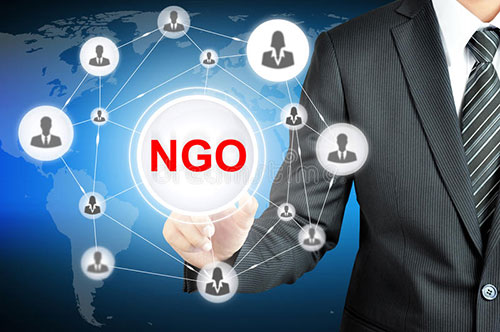
If you listen to politicians and journalists here, you will hear of that curious creature rajya novana sanvidane, a Non-State Organization (NSO). Where do you get them? In the uninstructed and dead minds of those who use those terms. In the real world, where politicians and journalists have developed minds, there are Non-Governmental Organizations (NGO). The United Nations is an organization set up by state parties, not by governments. It is true that agents of states, governments, make the United Nations work or fail. Governments may change but not the states, except rarely. When Eritrea broke away from Ethiopia, a new state was formed and was so recognised by the United Nations. However, the LTTE that tried to set up another state was crushed by the established state that it tried to break away from, and the UN had nothing to do with them.
This entirely unnecessary confusion, created out of ignorance, is so destructive that organizations completely loyal to the existing state, are made to be traitorous outfits, for they are ‘non-state organizations’ within the state. There are citizens of each state, but no citizens of any government. Government is but an instrument of the state. In most states there are organizations, neither of the state nor of government: religious organizations including churches. But none of them is beyond the pale of the state.
Those that speak of rajya novana sanvidane give that name partly because they have no idea of the origin of non-governmental organizations. NGOs came into the limelight, as donor agencies, noticed that some governments, in East Africa, in particular, did not have the capacity and the integrity to use the resources that they provided. They construed, about 1970, that NGOs would be a solution to the problem. Little did they realize that some NGOs themselves would become dens of thieves and brigands. I have not seen any evaluation of the performance of NGOs in any country. There was an incomplete essay written by Dr. Susantha Gunatilleka. NGOs are alternatives to the government, not to the state.
Our Constitution emphatically draws a distinction between the government and state, and lays down that the President is both Head of Government and Head of State (Read Article 2 and Article 30 of the Constitution.) It is as head of state that, he/she is the Commander of the Armed Forces, appoints and receives ambassadors and addresses Parliament annually, when a prorogued Parliament, reconvenes. He/she presides over the Cabinet as head of government. The distinction is most clear, in practice, in Britain where Queen Elizabeth is the head of state and Boris Johnson is the Prime Minister and head of government. However, in principle, Johnson is the Queen’s First Minister appointed by the sovereign, and resigns by advising her of his decision to do so.
In the US and in India the term ‘state’ has special significance. In India there is a ‘rajya sabha’ (the Council of States) whose members represent constituent States and Union Territories. Pretty much the same is true of the United States. In the US, executive power is vested in the President and heads the administration, government in our parlance. The Head of State does not come into the Constitution but those functions that one associates with a head of state are in the US performed by the President of the Republic. The US President does not speak of my state (mage rajaya) but of my administration, (mage anduva). Annually, he addresses Congress on the State of the Union. Our present President must be entirely familiar with all this, having lived there as a citizen of the US for over a decade. It is baffling when someone speaks of a past state as a traitor to that same state. It is probable that a government was a traitor to the state. ‘Treason against the United States, shall consist only in levying war against them, or in adhering to their (States’) enemies, giving them aid and comfort’. That a state was a traitor to the same state is gobbledygook.
Apart from probable confusion that we spoke of in the previous paragraph, it is probable that a president and other members of a government, including members of the governing party here, find it grandiloquent to speak of his/her/their state (mage/ape rajaya), rather than my government (mage anduva) or Sirisena anduva’ and not Sirisena state; it was common to talk of ‘ape anduva’ in 1956; politicians in 1956 were far more literate then than they are now.
When translating from another language, make sure that you understand a bit of the history of the concept that you translate. A public school in the US is not the same as a public school in the UK.
MAHADENAMUTTA









